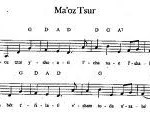The triumph of Mordechai
 Whether it is the melody or the words, Ma’oz Tzur is top of the pops.
Whether it is the melody or the words, Ma’oz Tzur is top of the pops.
Fortunately, we know who wrote it – a medieval Ashkenazi poet called Mordechai. The initial letters of the verses yield his name.
Even if we accept the theory that the sixth verse that many people tack on at the end is both genuine and by the same author, we can easily maintain the “Mordechai” acrostic.
This sixth verse begins CHasof Zero’a Kod’sh’cha – “Make bear Thy holy arm”, a plea to God to redeem His people. The initial letters make up CHaZaK – “be strong”, and there is ample precedent in Jewish hymnody for an author’s name to be followed by a pious wish such as “may he be strong” or “may he be blessed”.
Our problem arises when we try to identify the Mordechai of the poem. It cannot be the Biblical Mordechai, but it may be Mordechai ben Yitzchak, author of the Shabbat song, Mah Yafit – “How beautiful and pleasant you are (O Sabbath)”. This poem also has a “Mordechai” acrostic and a somewhat similar style.
Both poems date from the 13th or early 14th century, an age of grave suffering for Jews. Both address the problem of being a Jew at a time of persecution – one in forthright appeal to God to save His nation, the other in quiet encouragement to Jews to maintain their love for their tradition.
This is the dual message of Judaism in times of difficulty – have faith in God and faith in ourselves.
For more expositions and insights on Chanukah by Rabbi Dr Raymond Apple, visit the OzTorah Chanukah page.



